




Having a washing machine is a convenience that many of us take for granted. We simply toss our dirty clothes in, add some detergent, and press start. But how often do we think about cleaning the machine itself?
According to experts, it is recommended to clean your washing machine at least once a month. Over time, residue from detergent, fabric softener, and dirt can build up inside the machine, leading to unpleasant odors and even potential damage to your clothes. Regular cleaning can help prevent these issues and ensure that your washing machine continues to run efficiently.
“Cleaning your washing machine is an important part of maintaining its performance and longevity,” says John Smith, a laundry expert. “Neglecting to clean it can lead to a variety of problems, including mold and mildew growth, clogged filters, and even damage to the machine’s internal parts.”
So how do you go about cleaning your washing machine? There are a few simple steps you can follow. First, check the manufacturer’s instructions for any specific cleaning recommendations. Then, start by running an empty cycle with hot water and a cup of vinegar to help remove any built-up residues. You can also use a specialized washing machine cleaner or a diluted bleach solution for a deeper clean. Finally, don’t forget to wipe down the inside of the machine, including the door seal, drum, and detergent dispenser, with a damp cloth.
By incorporating regular washing machine cleaning into your routine, you can extend the life of your machine, improve its performance, and ensure that your clothes come out cleaner and fresher. Don’t overlook this important maintenance task – your washing machine will thank you!
How Often Should You Clean Your Washing Machine?
Keeping your washing machine clean is essential for maintaining its performance and preventing any unpleasant odours. The frequency at which you should clean your washing machine depends on several factors, including how often you use it and the type of laundry you wash.
General Guidelines
- It is recommended to clean your washing machine every month or every 30-40 loads of laundry.
- If you have a high-efficiency washing machine, it is especially important to clean it regularly as these machines have more nooks and crannies where dirt and detergent residues can accumulate.
- If you notice any signs of a dirty washing machine, such as a musty odour, stained clothes, or mouldy gasket, it’s time to clean it.
Steps to Clean Your Washing Machine
- Start by wiping down the exterior of the washing machine with a damp cloth and mild detergent.
- Remove any lint or debris from the lint trap or filter.
- Mix equal parts of white vinegar and water in a spray bottle. Spray the solution onto a microfibre cloth and wipe the drum and door seal thoroughly.
- If your washing machine has a detergent dispenser, remove it and clean it separately with warm soapy water.
- Run a hot water cycle with no clothes in the machine. Add 2 cups of white vinegar to the detergent dispenser or directly into the drum. This will help remove any built-up residue and odours.
- Once the cycle is complete, wipe the drum and door seal again with a clean, damp cloth. Make sure to dry the drum and all the crevices thoroughly.
Maintenance Tips
To keep your washing machine clean and in good working condition, consider these maintenance tips:
- Don’t overload the washing machine. This can lead to poor cleaning and strain the machine’s motor.
- Use the recommended amount of detergent for each load to avoid excessive residue build-up.
- Leave the door open between washes to allow the drum to dry and prevent mould growth.
- Regularly clean the detergent dispenser and the lint trap or filter.
- Consider using a washing machine cleaner once every few months to maintain its cleanliness and efficiency.
By following these guidelines and performing regular cleaning, you can ensure that your washing machine continues to perform optimally and keeps your clothes fresh and clean.
Expert Advice
How often should you clean your washing machine?
Experts recommend cleaning your washing machine at least once every three months to ensure its optimal performance and to prevent the buildup of dirt, residue, and bacteria. Regular cleaning not only helps to maintain the cleanliness of your clothes but also extends the lifespan of your washing machine.
Signs that your washing machine needs cleaning

- Foul odor: If your washing machine emits a strong and unpleasant odor, it’s a clear sign that it needs cleaning. The buildup of detergent residue, dirt, and moisture can create a breeding ground for mold and bacteria, which can cause the foul smell.
- Visible dirt or stains: If you notice visible dirt or stains on your clothes after washing, it indicates that your washing machine is not cleaning them effectively. This can be a result of buildup in the drum, filters, or dispenser compartments.
- Excessive lint on clothes: When your washing machine is dirty, it may not be effectively removing lint from your clothes. If you notice excessive lint on your freshly washed laundry, it’s time to clean your washing machine.
- Slow drainage: A clogged drainage system can lead to slow or incomplete drainage of water from your washing machine. If you notice water pooling in the drum or your machine taking longer than usual to drain, it’s a clear sign that cleaning is required.
How to clean your washing machine
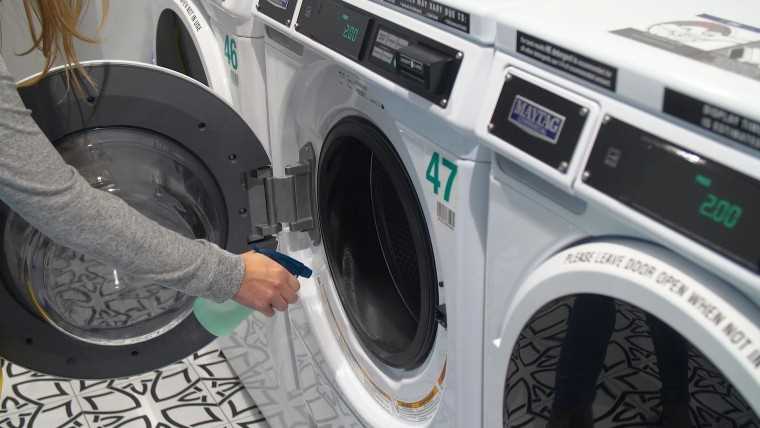
Cleaning your washing machine is a relatively simple process that can be done with common household ingredients.
- Start by running an empty hot water cycle: Fill your washing machine with hot water and add a cup of vinegar or a washing machine cleaner specifically designed for cleaning purposes. Run a complete cycle to remove any build-up and odors.
- Clean the drum and components: Once the cycle is complete, use a damp cloth or sponge to clean the drum, agitator, and other components of your washing machine. Pay extra attention to the rubber seals and detergent dispenser compartments.
- Remove and clean the filters: Check your washing machine’s manual to locate the filters. Remove them and clean any debris or lint trapped inside. Rinse the filters thoroughly before reinstalling them.
- Wipe the exterior: Finally, wipe the exterior of your washing machine with a clean cloth and a mild detergent. Pay attention to any control panels or buttons.
Preventive measures
To minimize the frequency of deep cleaning, there are some preventive measures you can take:
- Wipe down the drum and door seal after each use to remove any moisture and prevent the growth of mold.
- Leave the door of your washing machine open after each use to allow air circulation and prevent moisture buildup.
- Avoid overloading your washing machine, as this can lead to ineffective cleaning and strain on the machine.
- Use the recommended amount of detergent and avoid using excessive fabric softeners or additives, as they can leave residue behind.
Conclusion
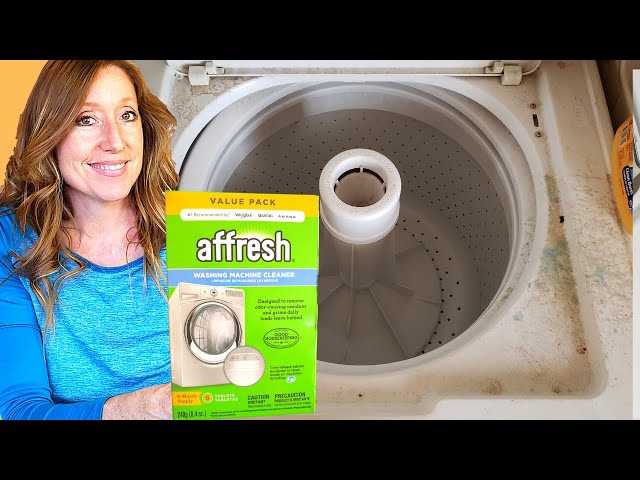
Cleaning your washing machine regularly is essential for maintaining its performance and ensuring clean and fresh laundry. By following the recommended cleaning frequency and taking preventive measures, you can prolong the lifespan of your washing machine and enjoy its optimal functionality.
Understanding the Importance of Regular Cleaning
Regular cleaning of your washing machine is essential to ensure its optimal performance and longevity. Here are a few reasons why regular cleaning is important:
- Preventing build-up: Over time, detergent residue, mineral deposits, and dirt can accumulate in your washing machine. Regular cleaning helps prevent this build-up, which can affect the cleaning efficiency and result in unpleasant odors.
- Improving cleanliness: A clean washing machine helps ensure that your clothes come out fresh and clean. Without regular cleaning, dirt and bacteria can thrive in the machine, leading to unpleasant stains and odors on your clothes.
- Preventing mold and mildew: Moist and warm environments are perfect breeding grounds for mold and mildew. Regular cleaning helps prevent their growth, which can be a health hazard and damage the internal components of your washing machine.
- Extending lifespan: Just like any other appliance, regular maintenance can help extend the lifespan of your washing machine. By keeping it clean and free from dirt and debris, you can minimize wear and tear on its internal parts, leading to a longer lifespan.
Now that you understand the importance of regular cleaning, let’s explore the steps you can take to maintain a clean washing machine and how often you should perform these cleaning routines.
Note: Remember to always refer to your washing machine’s manual for specific instructions on cleaning and maintenance.
Signs That Your Washing Machine Needs Cleaning
Regular cleaning of your washing machine is important to keep it functioning properly and to prevent the buildup of dirt, grime, and bacteria. Here are some signs that indicate your washing machine may need cleaning:
- Unpleasant Odor: If your washing machine starts to have a foul smell, it is a clear indication that it needs to be cleaned. Over time, detergent residue, fabric softener, and moisture can create a breeding ground for mold and mildew, causing a musty odor.
- Mold or Mildew Growth: If you notice black or brown spots, slimy residue, or discoloration around the washing machine’s rubber door seal or inside the detergent drawer, it is a sign of mold or mildew growth. These fungi can be harmful to your health and need immediate attention.
- Lint and Debris Buildup: If you start to notice an excessive amount of lint or debris on your clothes after a wash, it indicates a buildup of these particles in your washing machine. This can happen due to clogged filters or drains, which need to be cleaned regularly.
- Decreased Cleaning Performance: If your clothes are not coming out as clean as they used to, even after using the same detergent and settings, it may be a sign that your washing machine needs cleaning. Accumulated dirt and grime can interfere with the machine’s ability to effectively clean your clothes.
It is important to pay attention to these signs and clean your washing machine regularly to ensure its optimal performance and longevity. Refer to the manufacturer’s instructions or consult a professional for the best cleaning methods specific to your washing machine model.
Steps to Clean Your Washing Machine
Regular cleaning of your washing machine is essential to keep it functioning at its best and to prevent any unpleasant odors or buildup of dirt and grime. Follow these simple steps to effectively clean your washing machine:
- Gather Supplies: Before you begin, gather the necessary supplies. You will need white vinegar, baking soda, mild dish soap, a microfiber cloth, and an old toothbrush.
- Clean the Exterior: Start by cleaning the exterior of your washing machine. Wipe down the control panel, knobs, and any other surfaces with a microfiber cloth dampened with mild dish soap and water. Dry thoroughly with a clean cloth.
- Remove and Clean the Dispenser Drawer: Most washing machines have a removable dispenser drawer. Remove it and wash it in warm soapy water. Use an old toothbrush to scrub away any residue or buildup. Rinse thoroughly and let it dry completely before reattaching.
- Run a Cleaning Cycle with Vinegar: Pour two cups of white vinegar into the detergent dispenser or directly into the drum. Set your washing machine to the highest water level and hottest temperature setting. Start the machine and let it run for a full cycle. The vinegar will help remove any residues, mineral deposits, and odors from the machine.
- Clean the Door Seal: The door seal of your washing machine can accumulate dirt, lint, and residue. Mix equal parts vinegar and water, dip a cloth or sponge in the mixture, and thoroughly clean the door seal. Pay extra attention to any visible buildup or mold. Rinse with clean water and dry with a cloth.
- Wipe Down the Drum: Once the cleaning cycle is complete, use a microfiber cloth dampened with vinegar or water to wipe down the inside of the drum. Pay close attention to any visible stains or spots and use a toothbrush to scrub them if necessary. Wipe dry with a clean cloth.
- Clean the Filter: Locate the filter of your washing machine, usually located at the bottom front or back of the machine. Check the manufacturer’s instructions on how to remove and clean the filter. Use a toothbrush or cloth to remove any dirt or debris from the filter before rinsing it under running water. Make sure to thoroughly dry the filter before reinstalling it.
- Prevent Future Buildup: To prevent future buildup and odors, it is recommended to leave the door or lid of your washing machine open after each use to allow airflow. Also, periodically clean the dispenser drawer and wipe down the drum and door seal.
By following these steps and regularly cleaning your washing machine, you can ensure optimal performance, prolong the lifespan of your machine, and maintain fresh and clean laundry.
Benefits of Cleaning Your Washing Machine
- Improved Performance: Regular cleaning of your washing machine can help maintain its performance and efficiency. Over time, dirt, detergent residue, and fabric softener buildup can accumulate in the machine, causing it to work less effectively. By cleaning your washing machine regularly, you can ensure that it continues to wash your clothes thoroughly and efficiently.
- Extended Lifespan: Cleaning your washing machine can also help prolong its lifespan. The buildup of dirt and grime can cause wear and tear on various parts of the machine, leading to potential breakdowns and expensive repairs. By cleaning your machine regularly, you can prevent these issues and ensure that your washing machine lasts for many years.
- Eliminate Odors: Over time, the damp and warm environment inside your washing machine can create the perfect breeding ground for mold and mildew. This can lead to unpleasant odors on your clothes and in your laundry room. Regular cleaning can help eliminate these odors, leaving your clothes smelling fresh and clean.
- Prevent Stains: If your washing machine is not clean, it can transfer dirt, grime, and residue onto your clothes, which can result in stains. Regular cleaning can eliminate these built-up substances and prevent them from staining your clothes during the wash cycle.
- Improved Hygiene: Cleaning your washing machine regularly helps to maintain a hygienic environment for your clothes. By removing dirt, bacteria, and other germs that may have accumulated in the machine, you can ensure that your clothes are washed in a clean and sanitary manner.
In conclusion, cleaning your washing machine regularly has multiple benefits. It improves the performance and efficiency of the machine, extends its lifespan, eliminates odors, prevents stains, and ensures a hygienic washing environment. By incorporating regular cleaning into your laundry routine, you can enjoy cleaner clothes and a well-functioning washing machine.
Expert Tips for Maintaining a Clean Washing Machine
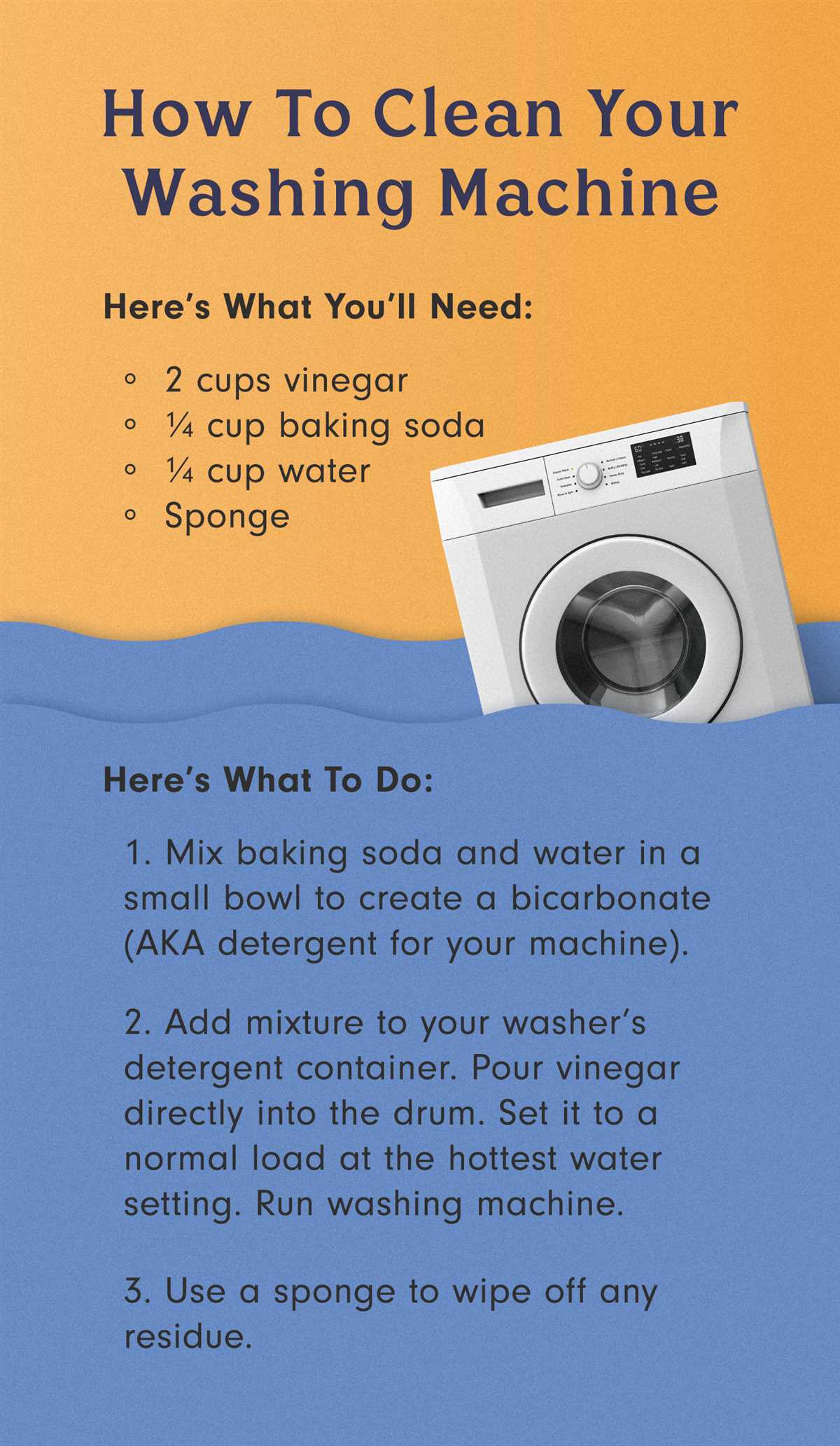
Maintaining a clean washing machine is essential to ensure its optimal performance and longevity. Here are some expert tips to help you keep your washing machine clean and running smoothly:
1. Regularly Clean the Washing Machine Drum
It is recommended to clean the washing machine drum at least once a month. Start by removing any debris or lint from the drum. Then, mix a solution of equal parts water and white vinegar and pour it into the detergent dispenser. Run the washing machine on a hot water cycle without any clothes. This will help remove any built-up grime and odors from the drum.
2. Clean the Detergent Dispenser and Filter
The detergent dispenser and filter of your washing machine can also accumulate dirt and residue over time. Remove the dispenser drawer and give it a thorough cleaning using warm soapy water. Clean the filter according to the manufacturer’s instructions. Regularly cleaning these parts will prevent clogs and ensure the proper functioning of your washing machine.
3. Wipe Down the Exterior Surfaces
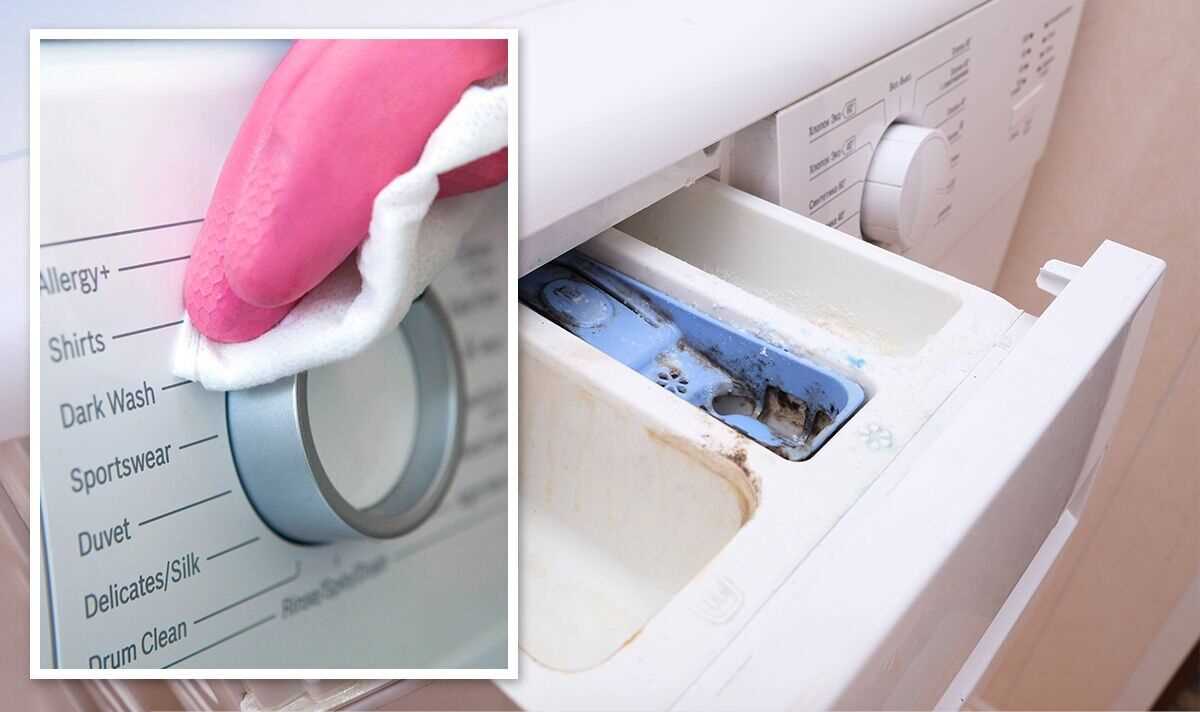
Don’t forget to wipe down the exterior surfaces of your washing machine. Use a damp cloth and mild detergent to clean the control panel, door, and other surfaces. This will not only keep your washing machine looking clean, but it will also help prevent the transfer of dirt and grime onto your clothes.
4. Leave the Door Open After Each Use

After each cycle, it is recommended to leave the washing machine door slightly open to allow air to circulate and prevent the growth of mold and mildew. This step is particularly important if you live in a humid environment.
5. Use High-Quality Detergents

The type of detergent you use can also affect the cleanliness of your washing machine. Opt for high-quality detergents that are specifically designed for use in washing machines. These detergents are formulated to help prevent residue buildup and maintain the cleanliness of your machine.
6. Schedule Professional Maintenance
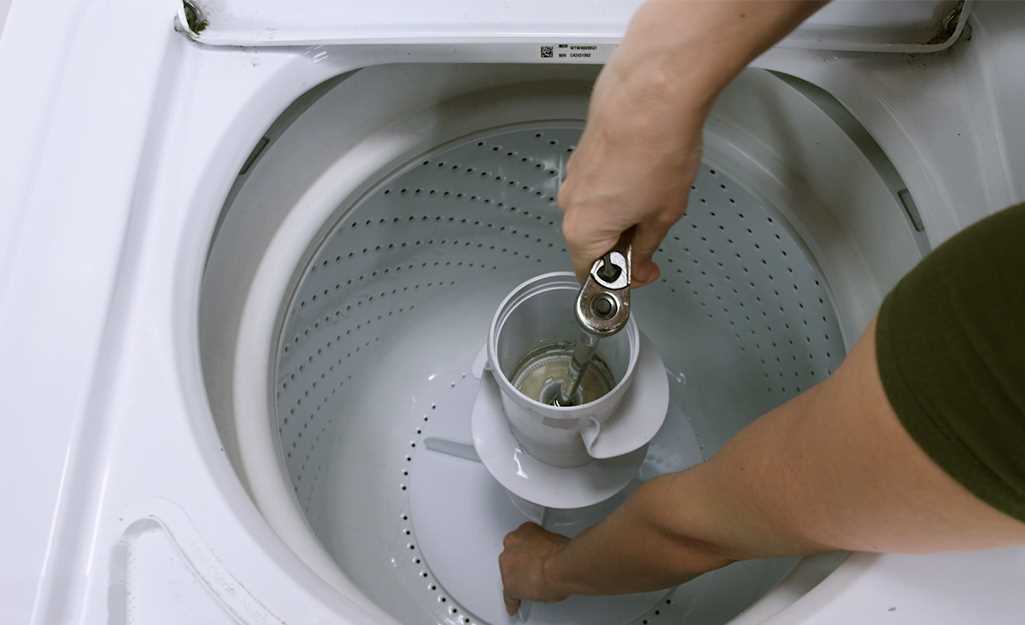
Regular professional maintenance can go a long way in ensuring the proper functioning of your washing machine. Consider scheduling a professional inspection and cleaning at least once a year. A qualified technician will be able to identify and address any issues that may affect the performance of your machine.
By following these expert tips, you can maintain a clean washing machine that will provide you with fresh and clean laundry for years to come.
FAQ
How often should I clean my washing machine?
According to experts, you should clean your washing machine every month.
Why is it important to clean your washing machine?
Cleaning your washing machine helps remove dirt, bacteria, and mildew that can build up over time and affect the cleanliness of your clothes.
What can happen if I don’t clean my washing machine regularly?
If you don’t clean your washing machine regularly, it can develop a foul odor, leave residue on your clothes, and even lead to the growth of mold and mildew.
How can I clean my washing machine?
You can clean your washing machine by running a hot cycle with vinegar or bleach, wiping down the drum and gasket, and cleaning the detergent dispenser and filter.
Can I use any type of cleaning product for my washing machine?
No, it’s best to use specific washing machine cleaners or natural alternatives like vinegar or baking soda. Avoid using harsh chemicals that can damage the machine.











